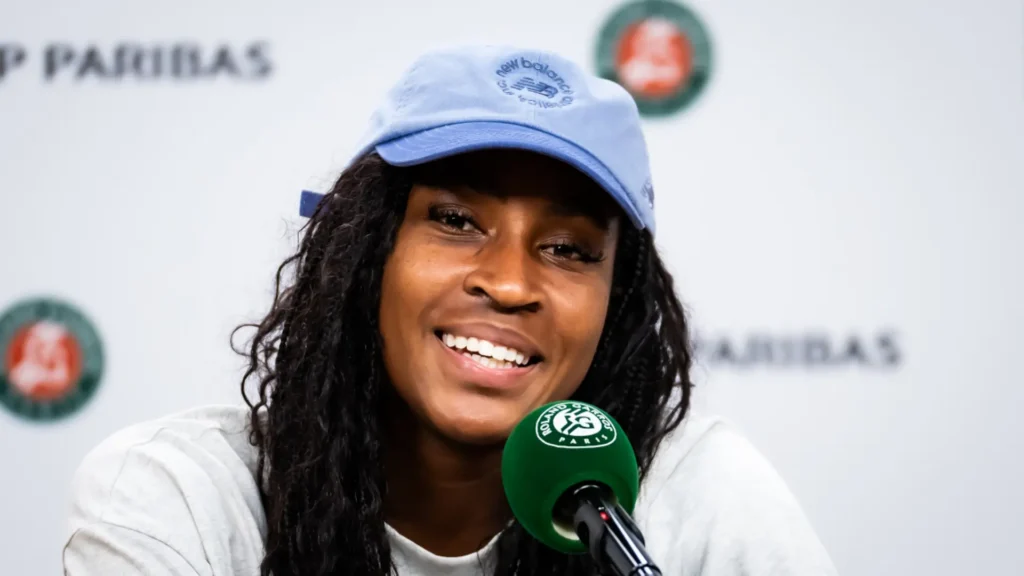In the high-stakes atmosphere of Roland-Garros, where the red clay reveals more than just skill—it exposes resilience, history, and purpose—a powerful subplot is quietly gaining momentum. While the racquets echo and the crowd roars, some of the game’s fiercest competitors are joining forces for something far greater than a title: true equity for women in tennis.
And leading that rallying cry? Coco Gauff and Ons Jabeur, two of the sport’s most beloved and vocal stars, who have found common ground in pushing for systemic change.
🌍 A Movement Born on Clay
The clay courts of Paris have witnessed revolutions before. But this time, it’s not about top spins or shot selections—it’s about fair treatment, equal visibility, and a call for institutional reform in women’s tennis.
Gauff, just 20, is already a Grand Slam champion and a consistent Top 5 player. But her passion extends far beyond baseline battles. She’s become one of the most outspoken young athletes in global sports, advocating for racial justice, gender equity, and youth empowerment. When she speaks, the world listens.
So when she backed fellow star Ons Jabeur—another trailblazer making waves with her Tunisian roots—it wasn’t just support. It was solidarity.
🎾 Ons Jabeur: The Voice That Sparked It
Ons Jabeur isn’t just a tennis player; she’s a cultural phenomenon. As the highest-ranked Arab and African woman in WTA history, Jabeur’s mere presence on court is historic. But at this year’s French Open, she made headlines for more than her drop shots.
She challenged the status quo—asking why women’s matches still lag behind men’s in scheduling, coverage, and prize money, particularly at combined events like Roland-Garros. Her frustration was clear: “We work just as hard. We entertain just as well. So why are we still an afterthought?”
Enter Coco Gauff.

In a moment that spoke volumes about unity, Gauff publicly backed Jabeur’s stance—saying, “I completely agree with Ons. We’ve seen improvements, yes, but there’s a long way to go.”
💬 When Stars Align: Unity in Purpose
Gauff and Jabeur aren’t just stars—they’re symbols. Symbols of what tennis is and what it can be. And when they align on an issue, the ripple effect is immediate.
Their joint advocacy has sparked a broader conversation among WTA players during the French Open fortnight. From locker room chats to press conference moments, more women are speaking out about:
- The disparity in night match scheduling, where men often get the marquee slots.
- Inequity in media coverage, especially in international broadcasts.
- The need for equal prize money across all tournaments, not just the Grand Slams.
What started as a conversation between two players is fast becoming a player-led movement—and fans are listening.
📺 The Visibility Problem
Gauff and Jabeur’s calls for change aren’t about ego—they’re about opportunity.
Imagine this: A thrilling three-set battle between two top-10 women barely gets primetime coverage, while a one-sided men’s match airs in the evening slot. It happens all too often, and it sends the wrong message—not just to fans, but to future generations of players.
Gauff highlighted it poignantly: “We want young girls to see themselves on the big stage. They can’t dream it if they don’t see it.”
It’s not about taking away from the men’s game. It’s about leveling the court.
🧠 More Than Just Words: Strategy and Action
This year, the French Open organizers have made some improvements—adding more women’s matches to show courts and hosting dialogue with WTA leadership. But it’s not enough, and the players know it.
Gauff and Jabeur are now working with the Women’s Tennis Association to push for measurable changes, including:
- Parity in match scheduling: Equal slots on showcourts and night sessions.
- Investment in media coverage: Ensuring broadcasters highlight WTA storylines and rivalries.
- Transparency in prize money distribution: Beyond the Grand Slams, many lower-tier tournaments still lag far behind.
These aren’t just complaints. They’re solutions backed by data, passion, and a belief that change is long overdue.
👑 Generational Impact
What makes this moment even more powerful is who these women are.
- Coco Gauff, the Gen Z phenom who fearlessly speaks out on social issues, showing that greatness is measured by more than just trophies.
- Ons Jabeur, the “Minister of Happiness,” who brings joy, flair, and purpose to a sport that often feels too rigid.
Together, they represent two continents, two cultures, and one shared fight: to leave tennis better than they found it.
And they’re not alone. Iga Świątek, Aryna Sabalenka, Daria Kasatkina, and many others are amplifying the same message. There’s a new era forming in women’s tennis—one where talent comes with tenacity, both on and off the court.
🥁 The Fans Are Rallying Too
Social media exploded after Gauff’s comments. The hashtags #SupportWTA and #LevelTheCourt trended on X and Instagram. Fans—men and women alike—are standing behind their heroes, calling for tournament organizers and media networks to step up.
Tennis forums, blogs, and influencer pages are echoing the sentiment: Why are we still having this conversation in 2025?
It’s no longer enough to celebrate Serena Williams’ legacy if we don’t also fight for the future of women’s tennis.
🔮 What Happens Next?
Gauff and Jabeur’s united front has brought fresh urgency to a decades-old conversation. As the French Open rolls on, all eyes will be on:
- WTA leadership—Will they take a firmer public stance?
- Roland-Garros organizers—Will they respond with action, not words?
- Sponsors and media partners—Will they finally give equal spotlight?
But the most exciting development? It’s the players leading the charge. Not waiting for change to come from above, but demanding it from within.
And that, perhaps, is the biggest win of all.

✨ Final Serve: The Revolution Is Female
The fight for women’s equality in tennis isn’t new—but the energy around it right now feels different. Because this time, it’s being driven by stars at their peak. By voices that carry weight. By women who aren’t afraid to risk comfort for the sake of progress.
Coco Gauff and Ons Jabeur are proving that power doesn’t just come from your serve—it comes from your stance. And if they continue to stand together, the sport they love will never be the same.
This isn’t just about the French Open.
It’s about every little girl watching.
It’s about every underserved athlete trying to rise.
It’s about a game that claims to be for all—but must now prove it.
And if Coco and Ons have anything to do with it, tennis won’t just change.
It’ll evolve.


